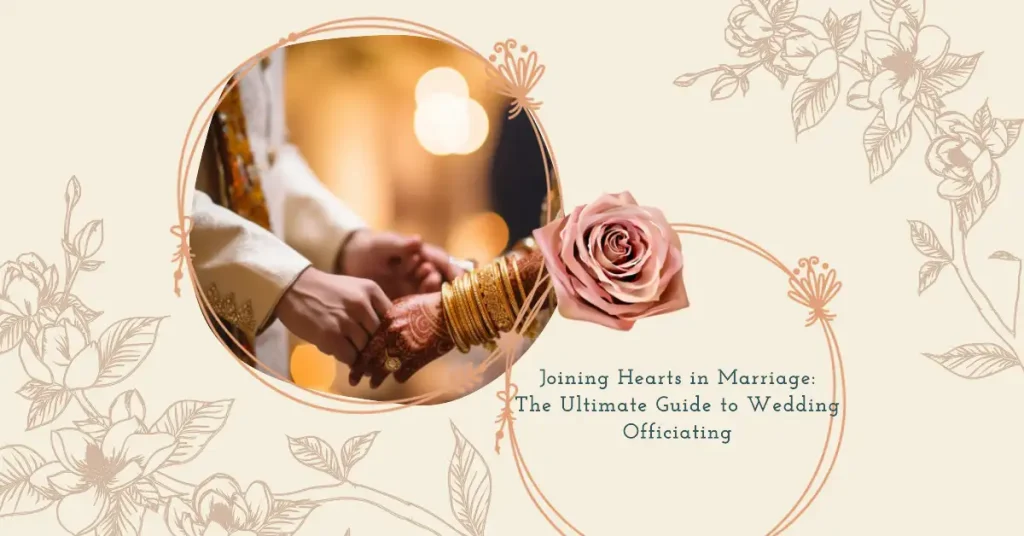Table of Contents
Legal Requirements for Wedding Officiants in Texas
In Texas, individuals must meet certain legal requirements before they can officiate a wedding ceremony. The state recognizes both religious and non-religious officiants, but they must be authorized to perform weddings.
For individuals interested in becoming a certified wedding officiant in Texas, the process involves completing and submitting the appropriate paperwork to the county clerk’s office. The candidate will also need to pay a fee and provide proof of identification. Once approved, the officiant will be authorized to perform weddings within the state.
It is important to note that while there are no specific educational or religious requirements for becoming a wedding officiant in Texas, the officiant must be over 18 years old, have no felony convictions, and be of sound mind.
- Carter, Lisa (Author)
- English (Publication Language)
- 107 Pages - 04/06/2024 (Publication Date) - Independently published (Publisher)
Religious Wedding Officiants in Texas
In addition to non-religious wedding celebrants, Texas also allows religious officials to perform wedding ceremonies. These officials can be ministers, priests, rabbis, or other religious leaders who are authorized by their particular religious organization to officiate weddings.
While there are no specific legal requirements for religious wedding officiants in Texas, most religious organizations have their own guidelines and requirements for their officials to perform marriage ceremonies. For example, many churches require their ministers to undergo special training or ordination before they can officiate weddings.
It’s important for couples to check with their chosen religious organization to ensure that their officiant meets all the necessary requirements and has legal authority to perform weddings in the state of Texas.
Non-Religious Wedding Officiants in Texas
For couples who may not have a religious affiliation or who are seeking a more secular ceremony, a non-religious wedding officiant may be the perfect fit for their needs. These officiants, also known as wedding celebrants, are trained professionals who specialize in creating customized ceremonies that reflect the couple’s beliefs, values, and traditions.
To become a non-religious wedding officiant in Texas, individuals must register with the county clerk in the county where they plan to officiate weddings. This typically involves completing an application, providing proof of identity and residency, and paying a fee. In addition, some counties may require non-religious officiants to obtain additional certifications, such as completing a course in ceremonial writing or public speaking.
Non-religious wedding officiants in Texas may offer a variety of ceremony styles and options, including personalized vows, readings, and symbolic gestures. They work closely with couples to understand their unique preferences and create a ceremony that is both meaningful and memorable. Some non-religious officiants may also be able to provide pre-marital counseling or other support to help couples prepare for their wedding day.
Interfaith Wedding Officiants in Texas
For couples looking to blend different religious traditions in their wedding ceremony, interfaith wedding officiants in Texas offer a unique solution. These officiants are trained to incorporate elements from multiple faiths and spiritual practices into a cohesive and meaningful ceremony.
Interfaith wedding officiants in Texas often have experience in multiple religious traditions, as well as a deep understanding of the cultural and spiritual significance of each. They work closely with couples to craft a ceremony that honors both partners and their respective beliefs.
When choosing an interfaith wedding officiant in Texas, it’s important to find someone who is not only knowledgeable and experienced, but also respectful of individual beliefs and practices. Couples should take the time to discuss their vision for the ceremony and ensure that the officiant is able to deliver a meaningful and personalized experience.
Section 5: Finding a Wedding Officiant in Texas
Choosing the right wedding officiant is a crucial decision in planning your special day. Here are some tips and resources to help you find the perfect wedding officiant in Texas:
1. Utilize Wedding Directories
There are several online directories that can help you find authorized wedding officiants in Texas. These directories provide a list of officiants in your area, along with reviews and ratings from past clients.
2. Ask for Recommendations
Word of mouth is a powerful tool in finding the perfect wedding officiant. Ask friends, family, or your wedding planner for recommendations. Personal recommendations can give you valuable insights into an officiant’s personality and style.
3. Conduct Interviews
Once you have a list of potential wedding officiants, it’s important to conduct interviews to find the best fit for you and your partner. Schedule a meeting or phone call with each officiant to discuss their experience, ceremony style, and any special requests you may have.
When selecting a wedding officiant in Texas, it’s important to ensure they are authorized to perform legal marriages in the state. Visit the Texas Department of State Health Services website for a list of authorized wedding officiants in Texas. You can also check with your county clerk’s office to verify that your chosen officiant is authorized to perform weddings in your specific county.
How to Become a Wedding Officiant in Texas
Individuals who wish to become authorized wedding officiants in Texas must meet certain legal requirements and follow specific steps. The process of becoming a wedding officiant in Texas is straightforward, and it allows individuals to perform marriage ceremonies in the state.
Legal Requirements for Wedding Officiants in Texas
Before becoming a wedding officiant in Texas, individuals must ensure they meet the legal requirements set forth by the state. These requirements include:
| Requirement | Details |
|---|---|
| Certification | To become a wedding officiant in Texas, individuals must obtain certification from a recognized religious organization or complete an online course. The certification must be submitted to the county clerk where the officiant plans to perform the ceremony. |
| Registration | Once an individual has obtained certification, they must register with the county clerk in the county where they plan to perform the ceremony. This registration must be done at least 30 days before the wedding date. |
It is important to note that the legal requirements for wedding officiants in Texas are subject to change. As such, individuals should always check with their county clerk for the most up-to-date information.
Steps to Become a Wedding Officiant in Texas
Once an individual has met the legal requirements to become a wedding officiant in Texas, they can begin the process of becoming authorized. The following steps are necessary to become a wedding officiant in Texas:
- Obtain certification from a recognized religious organization or complete an online course.
- Apply for a certificate of authorization from the Texas Secretary of State.
- Register with the county clerk in the county where the officiant plans to perform the ceremony.
It is important to note that the application for a certificate of authorization from the Texas Secretary of State requires a fee and proof of certification.
By following these steps and meeting the legal requirements, individuals can become authorized wedding officiants in Texas.
Officiating a Wedding in Texas: Important Considerations
Once you have found an authorized wedding officiant in Texas to perform your ceremony, there are important considerations to keep in mind. The officiant is responsible for ensuring that the wedding ceremony is legal, and it is important that they are familiar with all legal requirements for officiating a wedding in Texas.
It is also important to communicate with your officiant regarding the details of the ceremony, including any religious or cultural traditions that you would like to include. The officiant should have experience in planning and conducting ceremonies and can help guide you through the process.
Legal Responsibilities
Wedding officiants in Texas are responsible for ensuring that the marriage license is properly completed and filed with the county clerk’s office. They must verify the identities of the couple and witnesses and ensure that they sign the marriage license properly.
The officiant should also be familiar with Texas marriage laws, including any necessary waiting periods or age requirements. They should be able to advise you on any legal issues that may arise during the ceremony.
Cultural Sensitivity
Wedding ceremonies can be personalized to reflect the couple’s cultural or religious traditions. However, it is important to ensure that the ceremony is inclusive and respectful of all guests in attendance.
Your wedding officiant should be open to incorporating any cultural or religious traditions that are important to you and your partner while ensuring that the ceremony is accessible to all guests.
Communication with your officiant is key to ensuring that your wedding ceremony is a meaningful and unforgettable experience.
Conclusion
In conclusion, finding the right wedding officiant in Texas can be a daunting task, but understanding the legal requirements and available options can help simplify the process. Whether you are looking for a religious, non-religious, or interfaith officiant, there are many certified and authorized wedding officiants in Texas to choose from.
When searching for an officiant, it is important to consider their qualifications, experience, and personal style. Additionally, couples should be aware of the legal responsibilities and cultural considerations involved in officiating a wedding in Texas.
For those interested in becoming a wedding officiant in Texas, it is necessary to follow the proper steps and obtain the required certification and registration.
Overall, working with a professional and reputable wedding officiant can help ensure a memorable and meaningful wedding ceremony.
FAQ
Q: What are the legal requirements for wedding officiants in Texas?
A: To become a wedding officiant in Texas, individuals must meet certain legal requirements, including certification and registration processes.
Q: Who can serve as religious wedding officiants in Texas?
A: Religious wedding officiants in Texas can include ministers and priests who meet the requirements set by their respective religious institutions.
Q: Are there non-religious wedding officiants in Texas?
A: Yes, there are non-religious wedding officiants in Texas, such as wedding celebrants, who can perform ceremonies without a religious affiliation.
Q: Can interfaith wedding officiants perform ceremonies in Texas?
A: Yes, interfaith wedding officiants in Texas are able to perform ceremonies that incorporate different religious traditions.
Q: How can I find a wedding officiant in Texas?
A: There are various resources available for finding a wedding officiant in Texas, including directories, recommendations, and interviews.
Q: What are the steps to become a wedding officiant in Texas?
A: To become an authorized wedding officiant in Texas, individuals need to follow specific steps and meet certain requirements.
Q: What important considerations should wedding officiants in Texas keep in mind?
A: Wedding officiants in Texas should be aware of their legal responsibilities, carefully plan ceremonies, and be sensitive to cultural considerations.






